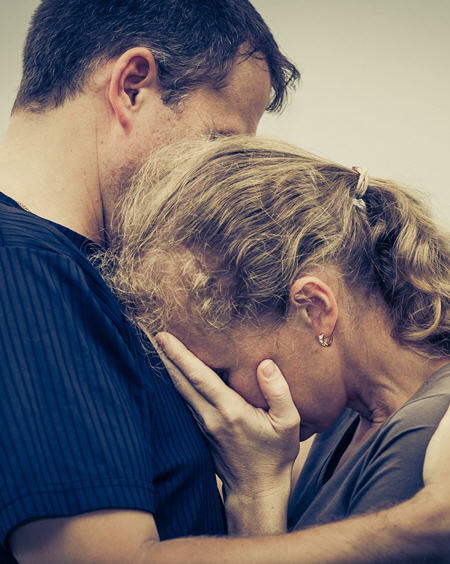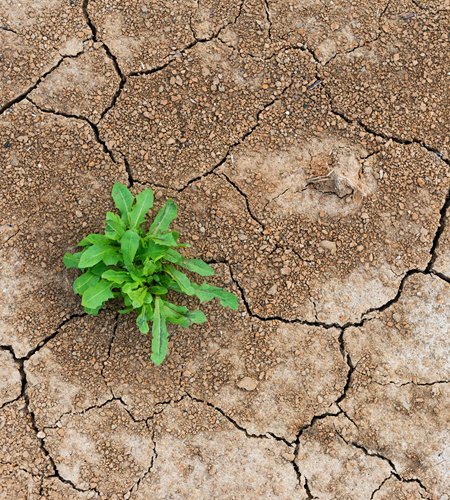 We’ve all known it, and we’ve all said it: “Life happens.”
We’ve all known it, and we’ve all said it: “Life happens.”
You’re in a good relationship, have a house that feels like home, and making good money. Life is good, and you’re having a great day.
Then your spouse walks through the door and slams his stuff down on the table, “I lost my job.” He made more money for the household, so you know your life is about to change.
Then the phone rings. Your mom got some “abnormal” test results back, and they think it’s serious.
Your heart is broken, and your mind is racing…
What are we going to do?
What if they need to live with us for support?
How are we going to afford to stay in this house?
Trials and tribulations are an inevitable part of life.
We can’t avoid them and trying only leads to disconnection, anxiety, and fear.
It might be that unexpected changes like losing a job or receiving that dreaded phone call are wearing on you. Or a lifetime of small (or large) traumatic events might keep you from thriving.
You power through because you always have. You don’t want to think about the challenging or damaging parts of life, so you take on more activities, more jobs, more household projects. As long as these parts of your life are good, everything else will be manageable.
Doing more feels good because it’s productive. Ever add something you did to your to-do list so that you can cross it off? It’s okay to be productive, to love productivity. It is not okay to channel subconscious feelings of anxiety and fear into activities that will eventually wear you down and leave you feeling exhausted, disconnected from others, and inadequate.
 The ability to recover from or adjust easily to misfortune or change…
The ability to recover from or adjust easily to misfortune or change…
That’s a dictionary definition of “resilience,” but, to me, resilience means “struggling well.”
Continued exposure to challenging life events is draining. There is no way around that. There is a way around the reactive, fearful, resentful responses to these events.
You come home from a long day of work, you feel drained, and are struggling. You tell yourself you should tidy up your house, prepare dinner for everyone, exercise, and finish a list of online activities on that to-do list.
The phone rings, and it’s someone who typically takes a lot from you, always talking and asking very few questions.
Instead of hanging up, you juggle the phone while starting all your other tasks. Now you didn’t get to squeeze in that exercise, and your family isn’t impressed with your dinner because they really just wanted mac and cheese. You fly off the handle.
“Everything I do is for you! I work, clean, cook, and sacrifice my needs, so YOU have what you need.”
You finish the cleaning (to make a point) and storm up to your room, calling someone to vent about how ungrateful everyone in your family is.
We’ve all been there. There’s a difference between a lousy day and repeated patterns of behavior, creating separation and anger.
How would the evening have been different if you would have stopped right when you got home and permitted yourself to do something brief for you?
What if you told that person on the phone it wasn’t a good time, and you’d call at a different time?
What if you outsourced some of the cleaning or even gave it up altogether because today you just needed a break?
These are all part of resilience. Resilience isn’t about eliminating struggles. It’s about slowing down the reactivity, increasing boundaries and awareness of yourself and others, and asserting what you need so that when you struggle, you struggle well.
Building resilience is an important way of coping with your life’s challenges and avoiding those adverse outcomes. We can’t keep struggles from happening in life, but we can enhance our ability to adapt to emotional pain and stress in a way that brings peace and helps us grow.
Resilience is a key factor in long-term mental health.
 Resilience is a skill and a state of being.
Resilience is a skill and a state of being.
A resilient person doesn’t escape life’s challenges. That’s impossible. We can never fully prepare for what hardships might cross our paths.
But we can build resilience so, when those hardships arise, we have a strong foundation to navigate our emotions through the experience and come out okay on the other side.
Skills of resilience include awareness of self and others, interpreting events rationally, knowing when to reach out to others, and building mental and physical capacity for coping without becoming ill. Resilience is about adapting in the face of adversity, trauma, and tragedy. Adaptation requires wellness, acceptance, and practice.
A resilient state of being is empowering. It allows you to see the bigger picture, build your self-confidence, make realistic plans, carry them out, manage strong feelings, connect deeply with others, and be flexible. This is freedom.
Building resilience requires exploration of your inner workings.
When something bad happens, does it always feel like your fault… or always someone else’s?
The belief that you are always responsible for others’ outcomes or have no control over anything is a sign you lack resilience. Enhancing your resilience allows you to release inappropriate responsibility for others and yourself.
Are you fearful when things are going well because you can’t stop waiting for the other shoe to drop?
The fear that something terrible is bound to happen is a stress response, likely due to a history of challenging experiences that have worn you down. It keeps you from thoroughly enjoying the present and embracing the resilience you have inside you that’s helped you navigate those experiences for this long.
Do you continuously ruminate about things other people have said or done that bothered you?
Resilient people do not let the opinions and minor behaviors of others break them. They practice self-awareness to acknowledge where/how it hurts them, validate their emotions, accept the situation, and let it go. This way, your life is your own, not someone else’s.
 Let’s work together to build your resilience!
Let’s work together to build your resilience!
Changing narratives…
We all have stories about ourselves.
Most of them are created early in childhood and lived out in subtle or direct ways throughout the lifespan. It is normal not to know what these narratives are, as many of them are established early in life and live deep in the subconscious mind. By uncovering our narratives, we get to rewrite stories that are empowering and, most importantly, ours based on who we are today, not who we were yesterday.
Facing fears…
Society tells us to avoid difficult things. Countless industries focus their marketing on how to get what you want, more comfortable, faster, and with less work than ever before (insert all diets and money-making schemes here). The truth is, facing fears is the only way to release them. By not facing fears, we give our power away to the fear, limiting our own lives. No, it is not easy, and it is not ‘faster than ever before.’ It will, however, change your life.
Remaining true to yourself…
You can learn to embrace difficult feelings and be confident in your abilities. Many people knowingly or unknowingly deny their own needs. This pattern of self-betrayal creates a void inside, often experienced as a lack of purpose in life. Honoring yourself is a truth that will allow you to honor others, creating preparation and flexibility with whatever comes your way.
Practicing self-compassion…
“I should have known better. How stupid of me. Why can’t I just do the things I say I’m going to do? Am I seriously having this conversation again? I’m sick of setting the same goals and getting nowhere. I hate me. I’m so disappointed with myself. “
Maybe making mistakes in your life has been met with criticism, blame, and judgment. This could be from others, from yourself, or both.
While we cannot control other people, we can learn to set boundaries and establish our own healthier reactions toward ourselves.
Self-compassion is essential for building resilience. We will not bully ourselves out of our feelings. By practicing self-compassion, you learn to let go of intense criticism and blame, recognize what you are feeling, and move forward.
Forgiving yourself…
This means forgiving yourself for what you wish you had done differently and letting go of the grudges that are weighing you down.
Sometimes, learning to forgive means recognizing and allowing yourself to grieve. This means genuinely acknowledging all the hurt that has kept you from being able to forgive yourself or others. Letting yourself feel those heavy emotions, knowing there is relief on the other side.
You wake up with a sense of inner peace. You know you have a full day of challenges and that you have the skills you need to manage them. You trust yourself. You ask for help when you need it.
You aren’t holding in anger or resentment because of constant unmet expectations. You make your expectations clear and know how to communicate effectively when they’re not met. You set boundaries.
You take breaks for yourself when you need them and don’t feel victimized by your life. You know what you need and manage all the intensity other people bring your way without getting overwhelmed.
You struggle well because you are resilient.
 You need resilience skills because there are triggers all around you.
You need resilience skills because there are triggers all around you.
A lot of people think of triggers as memories. There are way more triggers than memories about traumatic events.
Countless things trigger us in our environment. Changes in season, a phone call, a familiar face at the grocery store, someone’s perfume, an old song, an unexpected email, a late-night text, a Facebook memory, a holiday, a post, someone else’s facial expressions, being exhausted, a tone of voice, a television show, family members, friends, children, aging, a change in finances… the list is endless.
Subtle, consistent triggers from conscious or subconscious experiences, not just traumas, wear down your capacity to cope with the everyday stressors of life. But resiliency allows you to struggle well, continuing your life without being completely taken out by the challenges of being human.
It also allows you to grieve. I mean, REALLY grieve…
The relationship you thought you’d have…
The job that didn’t work out…
The family you never got…
The future you don’t see…
Resilience gives you the skills you need and the permission to feel it all, knowing you won’t get taken out by your emotions. You have the flexibility and trust required to heal. Resilience defines you, rather than the traumas and difficulties in your life. Resilience gives you hope, helps you practice acceptance, and does not stop you from trying again.
Are you not bouncing back from life’s trials?
At least not the way you need or want to? This is your calling!
And if you’ve had a series of traumatic experiences in your life, you are undoubtedly resilient and may just need support channeling the skills you’ve been using more effectively.
If you’re curious about the process, let’s talk about it during your free 15-minute consultation. Call today: (720) 755-7524.

